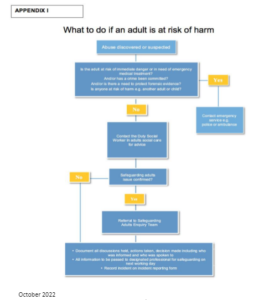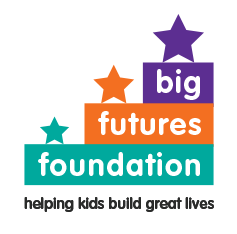BIG FUTURES FOUNDATION POLICY STATEMENT ON SAFEGUARDING ADULTS
(Created October 2022)
This document outlines the role of Big Futures Foundation (BFF) in safeguarding and promoting the welfare of the adults it seeks to benefit. BFF recognises that some of the parents/carers we help are especially vulnerable. The Trustees recognise that they have a duty of care towards the parents/carers with whom the charity has contact and will take all reasonable measures to ensure safeguards and arrangements are in place to:
- Promote an adult’s right to live in safety, free from harm, abuse, and neglect.
- Respect and protect the wellbeing of adults at risk of or experiencing abuse and ensure their views, wishes, feelings and beliefs are taken into consideration.
- Work with organisations, professionals, and others to prevent and stop the risk of abuse and provide help, support and guidance to adults who have experienced abuse and/or neglect.
This policy details the safeguarding arrangements which must be in place to ensure BFF fulfils its statutory duties and responsibilities with regard to safeguarding adults at risk of harm and abuse.
This policy applies to all trustees, staff, volunteers and third-party providers who act on behalf of BFF.
Big Futures Foundation believes:
That the safety, emotional and physical wellbeing of every adult of paramount importance irrespective of age, disability, gender reassignment, marriage or civil partnership (in employment only), pregnancy and maternity, race, religion or belief, sex or sexual orientation, as stated by the Equality Act 2010.
BFF recognises that the effective safeguarding of adults at risk of abuse is a shared responsibility and that there is a need for effective joint working with other agencies and the individual(s) concerned.
General Safeguarding Procedures:
Big Futures Foundation is committed to following best practice in working to prevent abuse and protect adults.
This will be promoted and supported by:
- A commitment of senior managers and board members to regularly review policy and working practices with regards to safeguarding adults within the organisation.
- Clear lines of accountability within the organisation for safeguarding.
- Service developments which take account of the need to safeguard all service users, and are informed, where appropriate, by the views of service users.
- Staff training and continuing professional development so staff understand their roles and responsibilities in relation to safeguarding adults at risk, implications of the Mental Capacity Act, and an overview of PREVENT.
- Appropriate safeguarding supervision and support for staff in relation to safeguarding practice.
- Safe working practices including recruitment and vetting procedures.
- Effective interagency working, including effective information sharing.
Definitions
BFF has adopted the following definition of an adult at risk / vulnerable adult:
Section 42 of the Care Act 2014:
- An adult who may be vulnerable to abuse or maltreatment is deemed to be someone aged 18 or over, and:
- Has needs for care and support (whether or not the local authority is meeting any of those needs);
- Is experiencing, or is at risk of, abuse or neglect; and
- As a result of those needs is unable to protect themselves against the abuse or neglect or the risk of it.
This document will use the term “adult at risk” from here onwards as this is the newly accepted terminology. This includes people with learning disabilities, mental health problems, older people and people with physical disabilities or impairments and also includes people who are vulnerable themselves as a consequence of their role as a carer for such a person.
They may need additional support to protect themselves, for example, in situations such as domestic violence, physical frailty or chronic illness, sensory impairment, challenging behaviour, drug or alcohol problems.
The Mental Capacity Act (MCA) 2005 provides a statutory framework which underpins issues relating to capacity and protects the rights of individuals where capacity may be in question. MCA implementation is integral to safeguarding adults at risk.
Abuse
Abuse is the violation of any individual’s human or civil rights by any other person or persons. We recognise that abuse of adults can take several forms:
- Physical abuse, where physical injury is inflicted or knowingly not prevented.
- Sexual abuse, where a person is involved in sexual activity to which he/she was unable to give informed consent.
- Psychological abuse, including emotional abuse, threats of harm or abandonment, deprivation of contact, humiliation, blaming, controlling, intimidation, coercion, harassment, verbal abuse, isolation or withdrawal from services or supportive networks, withholding affection, shouting, depriving the person of the right to choice, information and privacy.
- Neglect, where severe or persistent neglect causes serious impairment of a person’s medical or physical needs.
- Financial or material abuse, including theft, fraud, exploitation, and pressure in connection with wills, property or inheritance or financial transactions, or the misuse or misappropriation of property, possessions or benefits.
- Discriminatory abuse, including racism, sexism, and ageism, based on a person’s disability, and other forms of harassment, slurs or similar treatment.
- Domestic abuse: any criminal offence arising out of physical, sexual, psychological, emotional or financial abuse by one person against a current or former partner in a close relationship or against a current or former family member, including Honour based Violence and Forced Marriage.
- Organisational abuse, which involves the collective failure of an organisation to provide an appropriate and professional service to vulnerable people.
- Modern slavery, which encompasses slavery, human trafficking and forced labour and domestic servitude.
- Self-neglect, where an adult is at high risk due to severe injury and/or death due to lifestyle/self-neglect/refusal of services.
We take the following precautions to prevent abuse: -
All trustees of BFF will be DBS checked to an appropriate level according to their role.
-
We only appoint counsellors who are professionally trained and qualified to work with adults in a therapeutic setting.
-
All counsellors associated with BFF are required to be members of a professional body, and are required to abide by the ethical and professional framework set out by the professional body.
-
BFF only works with third party providers who are highly trained and experienced at working with adults who may be at risk.
-
All BFF staff delivering programmes will be trained by the current City of York Safeguarding Adults training programme to ensure they can identify different types of abuse and the indicators that are used to for assessing the risks involved where abuse is suspected.
-
All counsellors and programme leaders funded by BFF have been police-checked, which involves an enhanced DBS check.
-
BFF communicates regularly with the counselling providers providing regular opportunity for the discussion of safeguarding issues.
-
BFF requires that service providers carry out Safer Recruitment Procedures for all their staff working on BFF programmes. This process includes interviews, full chronological Curriculum Vitae, references and police checks.
-
Service providers must hold public liability insurance cover.
-
BFF holds public liability and professional indemnity insurance.
-
BFF provides information for parents/carers, where appropriate, on its safeguarding policy.
Policy on Recruitment and Induction of Staff, Volunteers and Freelance Therapists
Big Futures Foundation is committed to following Safer Recruitment Procedures for appointment of all staff and volunteers.
BFF recognises that anyone may have the potential to abuse a person in some way and will take reasonable steps to ensure unsuitable people are prevented from working with BFF. The following applies to all representatives of the Charity who in some way work with vulnerable adults.
Permanent Staff
Pre-selection checks must include the following:
- Permanent staff applicants should complete an application form or submit a full chronological Curriculum Vitae. The application form will elicit information about an applicant’s past and a self-disclosure about any criminal record.
- Consent should be obtained from an applicant to seek information from the Disclosure and Barring Service if appropriate.
- Two confidential references should be requested. These references must be taken up and confirmed through telephone contact.
- Evidence of qualifications and identity should be provided (e.g. passport or driving licence with photo).
Freelance Therapists or Service Providers
Pre-selection checks must include the following:
- Consent should be obtained from applicant to seek information from the Disclosure and Barring Service (online update service).
- If the freelance therapist or service provider is working with BFF for the first time and is not known to the Charity, a confidential reference should be requested. This reference must be taken up and confirmed through telephone contact.
- If the freelance therapist or service provider is working with BFF for the first time and is not known to the Charity evidence of qualifications and identity should be provided (e.g. passport or driving licence with photo).
Interview and induction
Permanent Staff
All permanent staff will be required to undergo an interview carried out to acceptable protocol and in line with the Charity’s Equal Opportunities Policy. All employees should receive a formal or informal induction, during which:
- A DBS check should be completed if appropriate.
- Training will then be arranged.
Freelance Therapists or Service Providers
Freelance Therapists or Service Providers should:
- Supply details to allow an online check to be carried out on the online DBS update service.
- Register with the DBS online update service if they have not already done so.
- Have training needs identified and undertake online training.
- Sign to show that they have read, understood and agreed to follow BFF’s Code of Conduct and safeguarding procedures as part of their contract.
Volunteer and trustee recruitment, interview and induction
Applicants for a voluntary and trustee post will be treated with the same principles in mind as that of permanent or freelance staff. Volunteer staff and trustees may be asked to have direct and unsupervised contact with families. They will be required to:
-
Complete an application form or provide a full chronological Curriculum Vitae.
-
Provide two references.
-
Attend an interview.
-
Undergo a DBS to the level appropriate to their role.
-
Attend an induction briefing on relevant policies.
Procedure for reporting concerns:
- Any counselling therapist, third party service provider, BFF staff member or volunteer who is concerned about a safeguarding issue should follow the safeguarding procedure of the organisation (e.g. Counselling Service Provider, other service provider or school) in which they are working. The practitioner should keep the designated contact for Big Futures Foundation closely informed of any such cases, subject to confidentiality restrictions, from the standpoint of a funder dedicated to keeping the services it provides to schools functioning smoothly.
- BFF will keep a record of any safeguarding concerns passed by a BFF employee to the organisation in which they are working. These records will be GDPR compliant, and will be kept until the person ceases to be part of a BFF programme.
- In the event of an employee, trustee or volunteer of Big Futures Foundation (BFF) being subject to an allegation, the designated contact at BFF would immediately contact the person responsible for safeguarding at the appropriate organisation where the work had been taking place. The following steps would then be taken in conjunction with the other organisation’s contact: i) receive information from those who have expressed concerns and record it in signed and dated written form; ii) seek advice from the statutory protection agency, such as the local social services department, or health board; iii) make a formal referral to a agency or the police.
- Should an allegation be made against the BFF Designated Contact another named BFF trustee will deal with and manage the allegation.
-
Designated contact at Big Futures Foundation for issues relating to safeguarding adults:
Michelle Foulks
Chief Executive Officer
Big Future’s Foundation
19 Chestnut Avenue
York YO31 1BR
Tel: 07503 493441
Email: michelle.foulks@bigfuturesfoundation.org.uk
Named BFF Trustee
Claire Douglas
Chair of Trustees
Tel: 07841 514518
Email: claire.douglas@bigfuturesfoundation.org.uk
A review of our Safeguarding Adults Policy and Procedures will take place every year and will be ratified at a meeting of the Board of Trustees.
Signed by Chair of Trustees
13/01/2023
………………………………………………. Dated: ………………………
Useful Numbers, Emails and Links
- Information for parents/carers and professionals on all aspects of safeguarding in the City of York can be found on the City of York Safeguarding website: Safeguarding adults – City of York Council. Essential for referral guidance, relevant forms, tools to identify neglect, abuse and exploitation, policies and training courses.
- City of York Social Care and Local Adult Safeguarding Board: 01904 555 111 (08.30 – 17.00) 01609 534527 (out of hours)
- North Yorkshire Police: 101 Non-emergencies
- Working to safeguard adults – Safeguarding Adults York
BIG FUTURES FOUNDATION CODE OF CONDUCT FOR GOOD PRACTICE
Abuse can occur within many situations including the home, work and the wider community. Some individuals will actively seek employment or voluntary work with young people in order to harm them. A counselling therapist, teacher, trustee, volunteer or BFF staff member could have regular contact with a person and be an important link in identifying cases where they need protection. All suspicious cases of poor practice should be reported following the guidelines in this document.
GOOD PRACTICE GUIDELINES
All people working for Big Futures Foundation should be encouraged to demonstrate exemplary behaviour in order to protect themselves from false allegations. The following are common sense examples of how Big Futures Foundation can create a positive culture and climate. This policy and these guidelines apply to anyone who works for Big Futures Foundation as a trustee, volunteer, on a permanent, temporary, or freelance contract.
Big Futures Foundation should:
- undertake to assess risks at the outset of any project with vulnerable adults and monitor risks throughout.
- identify the people with designated protection responsibility at the outset.
- engage in Safer Recruitment Procedures, including appropriate vetting of staff, trustees and volunteers through the Disclosure and Barring Service.
- know how to get in touch with local authority services, in case there is a need to report a concern to them.
- have agreed procedures for reporting suspicion or allegations of abuse
- offer training to staff whose jobs involve working closely with vulnerable adults.
- make clear who is the Designated Person responsible for dealing with any concerns about the protection of vulnerable adults.
- ensure confidentiality in order to protect the rights of employees, freelancers and volunteers and trustees, including safe handling, storage and disposal of any information provided on therapists or service providers as part of the recruitment process.
Therapists, service providers, staff, volunteers and trustees should:
- treat all people with respect.
- be excellent role models for dealings with other people.
- give enthusiastic and constructive feedback rather than negative criticism.
- put the welfare of each participant first, before achieving goals.
- ensure that wherever possible there is more than one adult present during activities, or at least that a therapist or service provider working on their own is within sight or hearing of others i.e. the door is kept open (as appropriate).
- respect a person’s right to personal privacy.
- encourage people to feel comfortable and caring enough to point out attitudes or behaviour they do not like.
- remember that someone else might misinterpret their actions no matter how well intentioned.
- be aware that physical contact with a person may be misinterpreted.
- only touch participants when it is absolutely necessary in relation to the activity and seek agreement from them or a permanent member of staff before doing so.
- recognise that special caution is required when discussing sensitive issues with people.
- be aware of Big Futures Foundation’s safeguarding principles, guidance and procedures and operate within those procedures.
- challenge unacceptable behaviour and report all allegations/suspicions of abuse.
Therapists, service providers, staff, volunteers and trustees should not: - have inappropriate physical or verbal contact with people.
- allow themselves to be drawn into inappropriate attention-seeking behaviour.
- jump to conclusions about others without checking facts.
- exaggerate or trivialise abuse issues.
- show favouritism to any individual.
- believe ‘it could never happen to me’.
- take a chance when common sense, policy or practice suggests a more prudent approach.
If a person tells me about the abuse they have suffered, what must I remember?
When abuse has been disclosed, reported or observed, it is important that the person subject of alleged abuse is treated with dignity, is involved as an equal in the investigation, and is kept fully informed on a regular basis.
They have the right:
- to be believed when they report abuse of themselves and/or others, unless there is direct and unequivocal evidence to the contrary.
-
To appropriate support and resources, in order to identify behaviour which constitutes abuse.
BFF will ensure appropriate professionals are alerted and involved to support all adults with regard to:
- A right to be safeguarded from abuse.
- A right to be taken seriously.
- Independent advocacy and/or support.
- A right to receive appropriate information on the safeguarding process.
- A right to privacy and confidentiality throughout the safeguarding process, except where this is not appropriate.
- A right to be involved in decisions regarding themselves, made as a result of the safeguarding process.
BFF will support any adult in facilitating access to advocacy services including making a referral in the absence of statutory services.
Any intervention to protect an adult at risk must be carried out with their consent unless this will increase their risk of harm, e.g. female genital mutilation (FGM), honour based violence or domestic abuse, thus highlighting that there may be occasions where consent is not required, due to an agency’s duty to protect others. This may be when there are concerns regarding wider groups of adults, young people or children at risk or when a criminal offence has taken place.
Procedure for responding to reports and incidents of abuse or alleged abuse
The seriousness or extent of abuse is often not clear when anxiety is first expressed. It is important therefore, when considering the appropriateness of intervention, to approach reports or incidents or allegations with an open mind.
In making any assessment of seriousness the following factors need to be considered:
- The vulnerability of the adult.
- The nature and extent of the abuse.
- The length of time it has been occurring.
- The impact on the individual and/or their carer/family.
- The risk of repeated or increasingly serious acts involving this or other vulnerable adults.
A decision may need to be made immediately about any urgent action required to protect the vulnerable adult. If the person is at great risk of harm or in need of immediate medical attention, contact should be made directly with the emergency services.
If the (alleged) perpetrator is also a vulnerable adult, consideration must be given to their safety and well-being and to their needs as vulnerable adult.
The views of the service user should always be taken into account and generally permission would be asked before doing so. However, in exceptional circumstances, if it is considered a person(s) is at serious risk of abuse then information may be disclosed without consent.
All matters of concern referred, will be investigated and should be passed to the designated Safeguarding Lead.
Complaints procedure
BFF has a clear and publicised procedure, capable of dealing with complaints from all service users, families and employees.
Appendix 1: Safeguarding Procedure Flow Chart and Local Contacts



